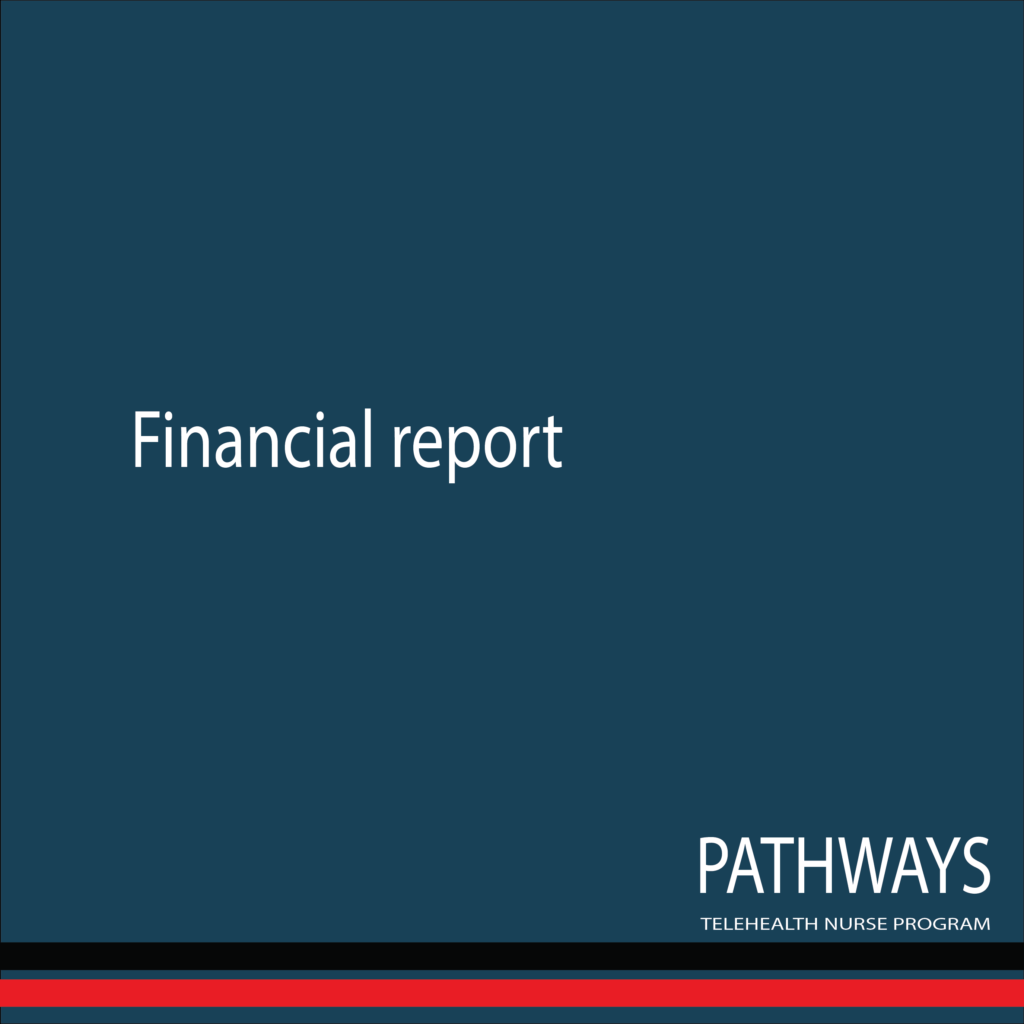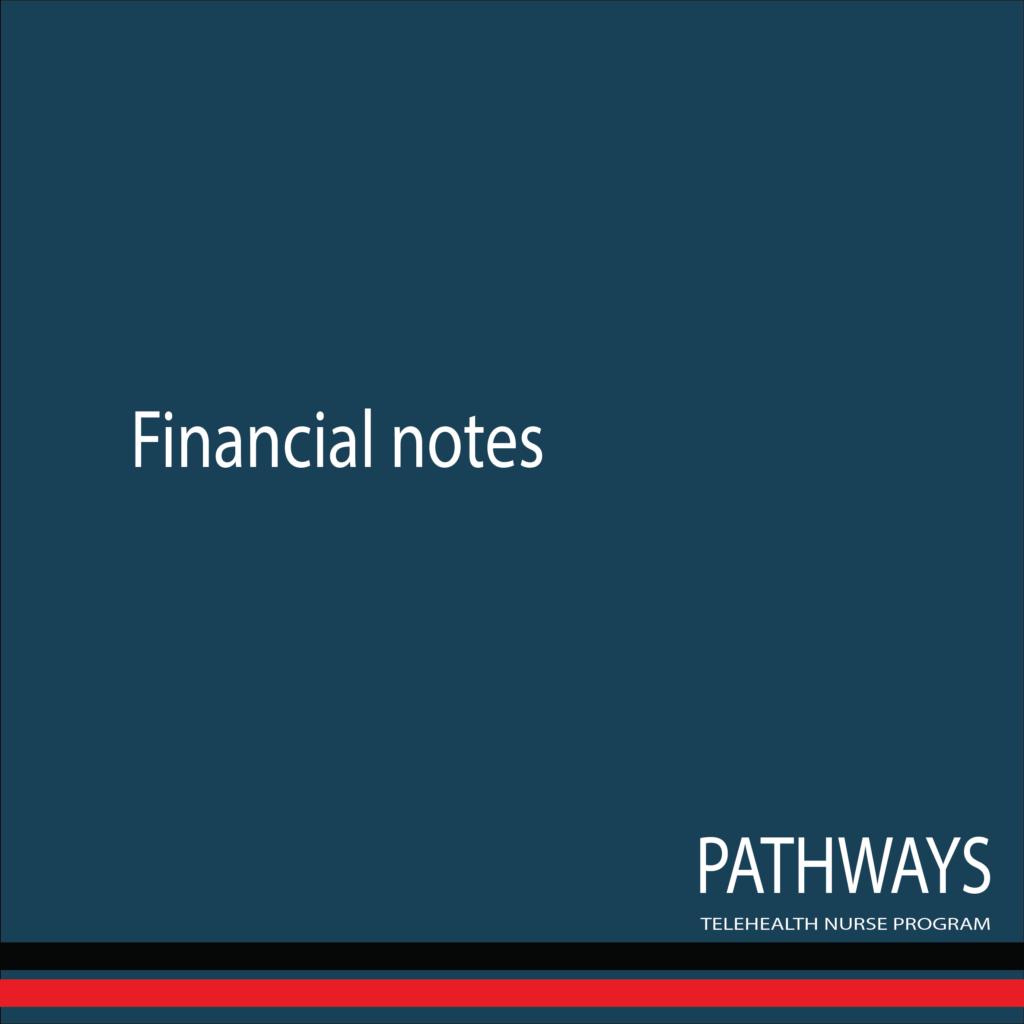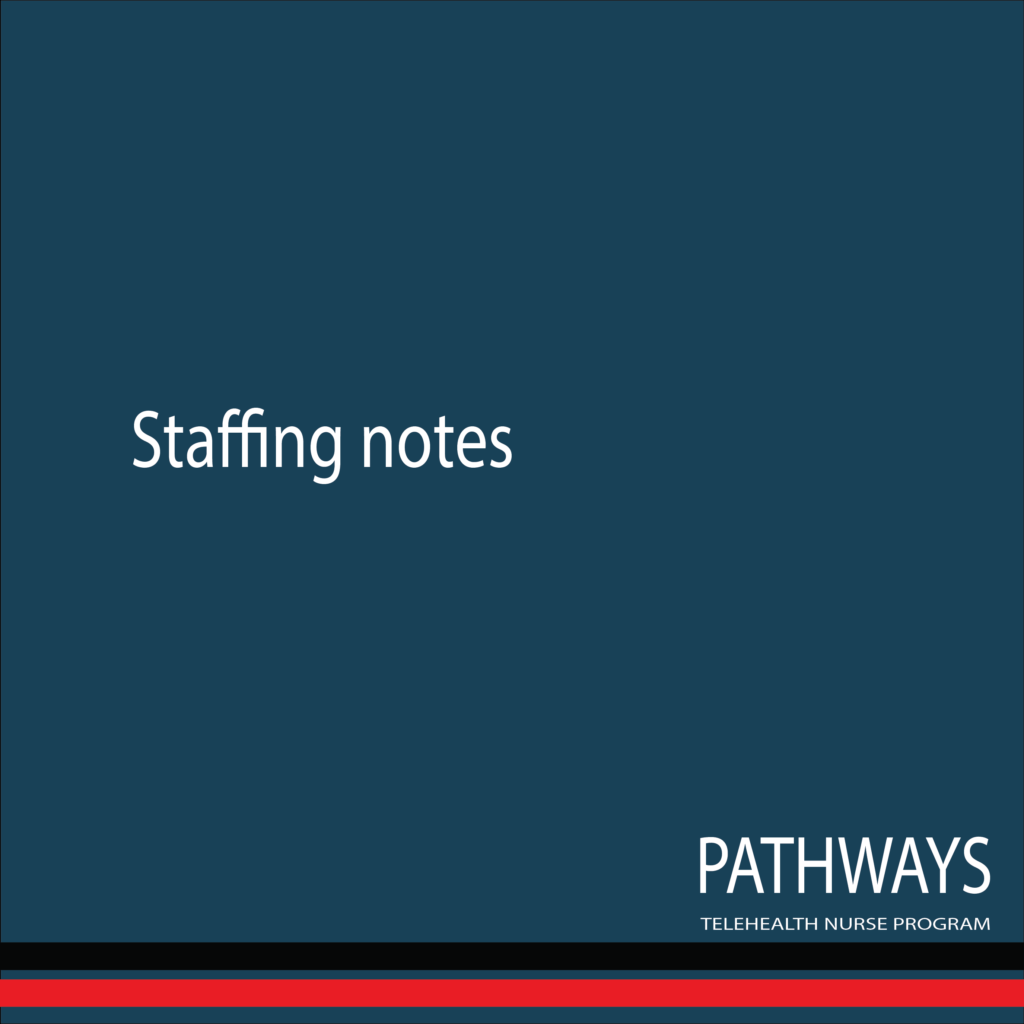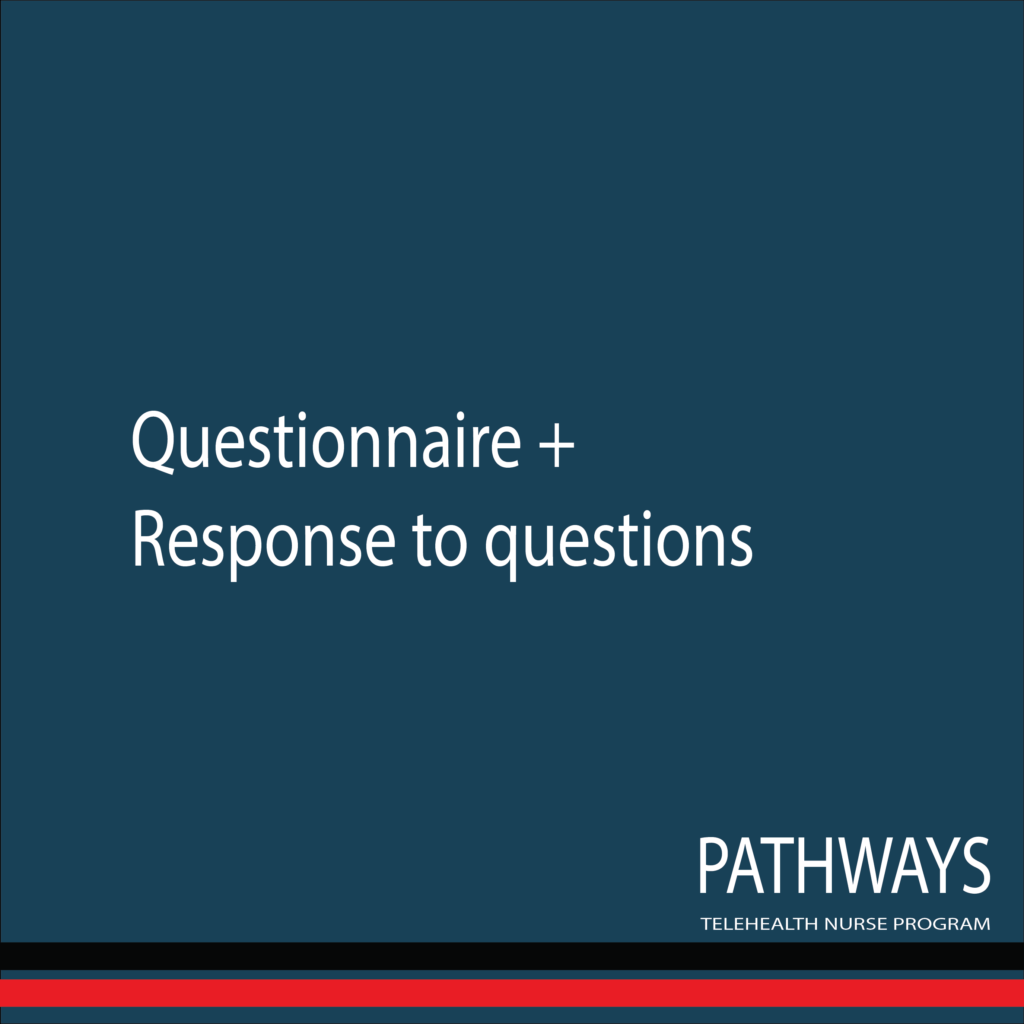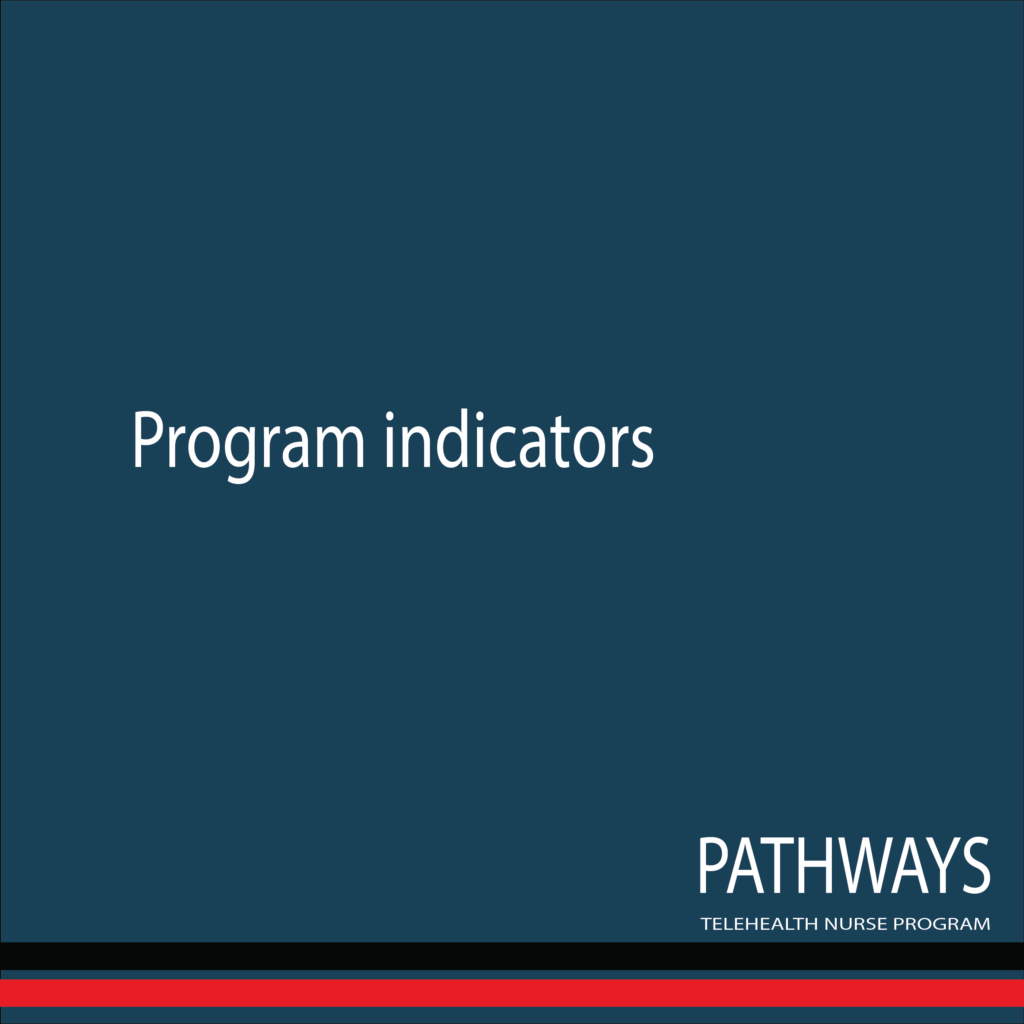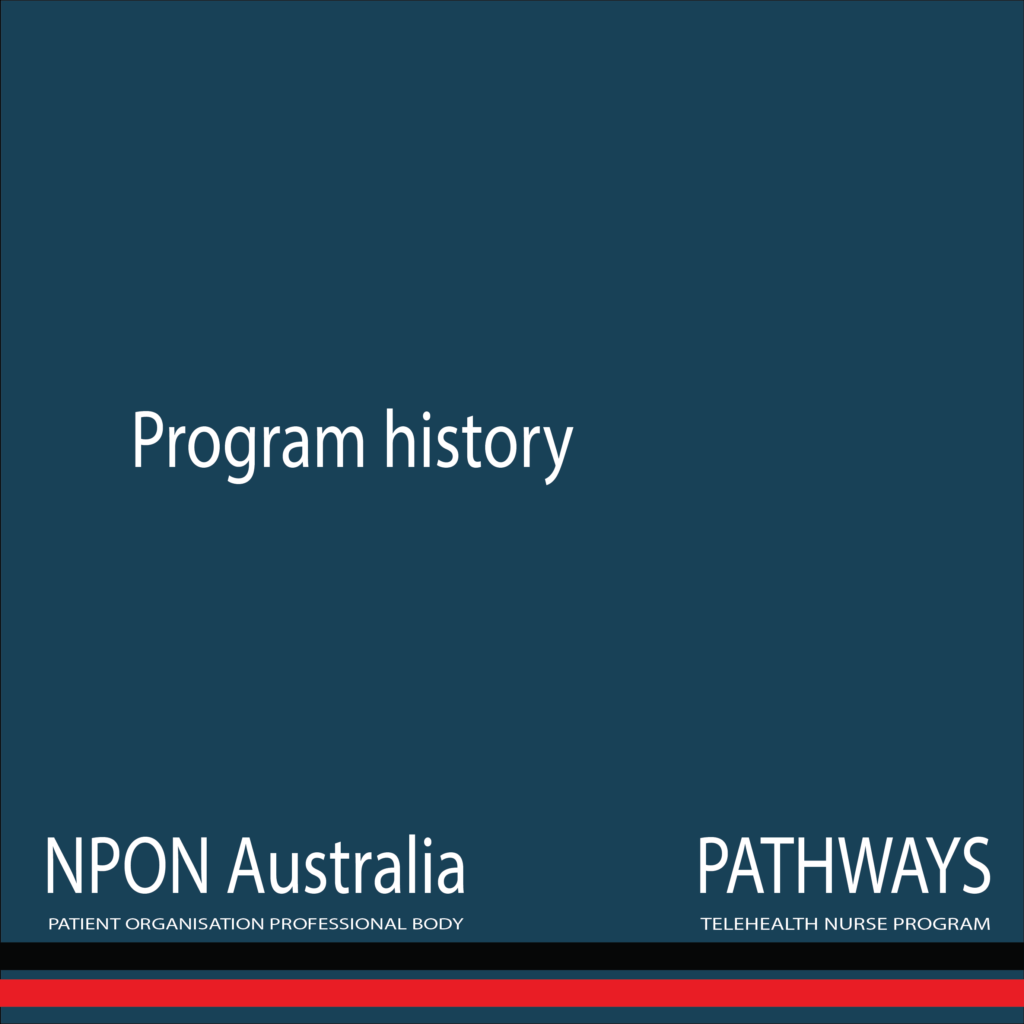
GOVERNMENT GRANT 2018
Initial funding for the Patient Pathways Telehealth nurse program was provided through Health in 2019. This was following a meeting with the Hon Greg Hunt MP, then minister for health. Greg Hunt invited CCDR to prepare a proposal to address issues of health system navigation that patients were facing. CCDR had been implementing a health system navigation service and the basis of the proposal was to test the protocol in a number of disease areas. Prior to government funding, CCDR has received a bequest from a patient’s family that were grateful for the support they had received from CCDR.
Funding was provided to CCDR and distributed amongst patient organisations. Funding for this program ended in June 2022.
The initiative places specialist telehealth nurses in community organisations. Patient pathways provides a remote clinic that can be inclusive of families, carers, and patients. All of the Patient Pathways telehealth nurses are able to consult with patients living in all areas, including regional or remote areas, without any of these patients having to leave their home, or paying any costs associated with travel and accommodation to access health services. Most importantly, Patient Pathways telehealth nurses help patients make the most of existing services within the Australian health system, including access to clinical trials.
The National Patient Organisation Network Australia sits within this funding, and through this initiative a network of 140 patient groups has formed which is the largest network of patient groups in Australia.
CCDR met with Ms Caroline Edwards (Deputy Secretary) early in the program to discuss how we should engage with the Health over the life of our grant. Despite our best efforts, the Health did not engage with CCDR. The Deputy Secretary did however provide advice that CCDR should aim to identify volume-based costing (cost per patient) and this advice guided much of the future decision-making within the program.
ELECTION COMMITMENT
On 1 March 2022, Mark Butler attended the National Patient Organisation Network Australia conference at the invitation of the community.
Twenty minutes before speaking at the conference, a text was received from Mark Butler’s then Chief of Staff informing CCDR’s Chief Executive that Mark would be making an announcement about Pathways funding.
This was the first CCDR had heard of the commitment and welcomed the news.
“Patients and their families in a position where they can make good, informed decision. Then they need more access to information. Not Dr. Google, but more access to good, quality, relevant information. I know that your organisations understand that more than anyone because that’s exactly what your organizations have been doing with Patient Pathways. I’ve studied this program. I know that this was something that you set up in partnership with Greg Hunt, he was a strong supporter of it even suggesting the name Patient Pathways, as I understand it.”
“It’s been delivering great supports through the Telehealth Nurse Program to ensure much better levels of care coordination and system navigation. Those are, as I said, perennial challenges in Australia’s healthcare system. Even for people who are experiencing high prevalence conditions, let alone people who are experiencing some of those rarer diseases we talked about earlier.”
“This is a program that’s really delivered enormous value for money for taxpayers, really changed the lives and the experiences of many patients and their families. It’s been evaluated twice as a very successful program, as I said, that delivers value for money. I’ve closely studied the pre-budget submission that CCDR has put into government for that to be extended beyond its dropped dead date at the moment, which is only several weeks away at the end of June.”
“Labor has decided, I’m pleased to announce, that if we are elected at the election that takes place probably in may this year, then we will adopt the case that’s argued in the pre-budget submission and ensure that Patient Pathways is funded for another three years in the manner and to the amount that is set out in the pre-budget submission, which is, I understand, it is a little less than $2.5 million.”
“These programs which are really relatively modest out over the Commonwealth government change and deliver really strong outcomes for patients and their families and they should continue to be supported by the Commonwealth government. Thank you very much for the invitation to be with you. As I said today, I’m sorry I’m coming to you from my house. It’s been a lovely opportunity for me. I hope to give you a bit of a sense about my views in this area as the shadow minister for health and obviously from a Labor Party point of view hoping to be the minister for health within a few months.”
“I really look forward, whatever happens, to continuing or being able to continue to partner not only with the network but with all of the many patient organisations that go up to make the network.”

After Labor’s election victory, by June 2022 CCDR had not yet heard anything from the minister’s office or Health. CCDR had seen in the ‘Costing documentation for the Australian Labor Party’s Election Commitments’ that the full amount had been placed in the budget with the indication of funding being made available on 1 July 2022.
In a call with the minister’s chief of staff on 9 June 2022, CCDR was assured that there were no issues with the funding and that they had instructed Health on 8 June 2022 to get in touch with CCDR. On Friday 10 June 2022 at 4.59pm AEST CCDR were advised by Health that a grant of $150,000 as bridging funding to cover six months of the program would be made available. Health noted that there remained an expectation that the independent evaluation will be completed to help inform implementation of the program beyond 31 December** This two-minute call was the only one that the chief of staff ever had with CCDR despite many requests to speak with him. Every other request to talk was ignored or we were sent back to Health.
In mid 2022, CCDR later engaged an external consultant to help us reach out to the minister’s office and have a constructive dialogue. This was refused and the feedback that we received was that the minister’s office did not like that we had spoken to the opposition, did not like that we had gone to the media and felt our correspondence was too aggressive. Whenever CCDR are given feedback, we always take the time to reflect on whether we could have done something better or differently. At the time we reflected on whether correspondence had been aggressive, but it had not been. It had been assertive, and it was a stark reminder that women are still too often perceived as being aggressive or too emotional when simply being assertive.
The shock that we would not be receiving the promised funding, 15 days before it was due was devastating and caused a sense of panic and disbelief. This was compounded because only days before the chief of staff had assured CCDR everything was ok. We spoke about organising nurses and patient groups to join Mark Butler at the funding announcement. He had every opportunity to explain that we were in fact not going to receive the funding promised, rather he chose to keep this information from CCDR and mislead us to believe everything was on track. His exact words were that ‘the minister had signed off on the grant and you have nothing to worry about’. As an organisation that has to have difficult conversations everyday with the patients that come through the Pathways clinic, we have opinions about this kind of deceit and lack of courage to disclose the truth.
On receiving the email from Health, CCDR’s Chief Executive texted the chief of staff to ask if the $150,000 was correct and he confirmed it was. The implication of the budget meant that one of the first actions of the Labor government was to cut – without reason or warning – funding to the National Patient Organisation Network (NPON) Australia.
The Chief of Staff replied that that amount was what was currently appropriated and that they would have a budget in October to deliver the full commitment. The Chief of Staff stressed the importance of going through the independent evaluation as this was going to be used to inform how the remainder of the commitment is structured.**
CCDR’s Chief Executive noted via text that CCDR had not been given any details on how we are meant to spend 150k over 6 months for a program that currently costs 520k per annum and asked to meet
The Chief of Staff responded that CCDR need to engage with Health directly and that Health’s advice is that the funding covers program costs for the federally committed initiative for 6 months. He noted his surprise that CCDR was talking about letting anyone go over this six month period and that regardless, CCDR need to engage with the department and talk through why that is the case. The Chief of Staff noted that then, they can respond.
CCDR’s Chief Executive responded “Don’t know what to tell you Nick. You’ve been given wrong advice”
A final response from the Chief of Staff was “That may be the case Kate, and if so we will deal with it”
CCDR did meet with Health and continued to share our concerns about the $150,000 budget. Partner organisation also noted their concerns. Despite asking for information, CCDR were not provided with any details about how the funding was calculated until 8 July 2022, one month after Mark Butler had signed off on the funding, noting that a budget would have been prepared well in advance for this to have been signed off. CCDR note that in the previous budget before the election, $150,000 was also assigned to the Pathways program however CCDR were never advised as to what this was earmarked for.***
Pathways partner organisations (except for Mito Foundation and Emerge Australia) wrote individual letters of support for CCDR and frustration over the election commitment not being honoured. The letters detailed the value organisations placed on the program as well as CCDR’s expertise and support to date. The needs and preferences expressed by patient organisations within these letters appears to be have ignored.
In the meantime, CCDR were being asked to sign the contract provided to them. This was a contract that came with a gag clause and other conditions that were in our view, not acceptable in the context of an independent health service. The contract was provided as a Deed of Variation that linked new terms and added various aspects of control to the original contract that CCDR had with the Department of Health and Aged Care.
** In Senate estimates on 16 February 2022 Mr Simon Cotterell stated that the evaluation was not related to the election commitment
*** In Senate estimates on 16 February 2022 Mr Simon Cotterell stated that the $150,000 indicated that the $150,000 was all that was available however as noted, CCDR were sent specific calculations on how the budget was specifically costed.
CCDR and partners continued to ask for meetings with Mark Butler and advocate for Labor to honour their commitment. One partner organisation lead a letter, co-signed by a number of partners, also asking for reimbursement of costs incurred while waiting for Labor to honour their commitment.
In July 2022, CCDR wrote to Mark Butler offering a solution that would allow funding to be released directly to patient organisations. In that letter CCDR confirmed our commitment to the program. At no time did CCDR state that we were walking away from the program or that we did not want to run it anymore.
On 16 February 2022 in Sentate Estimates, Simon Cotterell stated that CCDR had “decided to withdraw from the program”. This was misleading and incorrect and CCDR has concerns that decision-making about our program has be based on misleading advice from Health.
PROGRAM EVALUATION
On 7 July 2021, CCDR were informed that an extension of funding to support program management for the final 12 months had been approved by the Hon Greg Hunt MP, then Minister for Health. The same communication noted that there would also be an evaluation of the program. This was an unplanned evaluation and CCDR notes that it is always problematic in public health programs to implement a new evaluation methodology at the end of a program.
It would take 20 weeks from communication about the funding before it was released and this caused significant distress for CCDR.
On 7 January 2022, CCDR received an email from Health notifying them that the evaluation of the program would commence and they intended it to be completed by March 2022. The email included a draft Request for Tender (RFT) which Health was requesting CCDR to review. CCDR shared this with a government advisor as they felt this was a strange request and weren’t sure if sharing a tender with a third party was in breach of procurement law.
A meeting was set for 11 January 2022, however CCDR informed Health that the Chief Executive was only returning to work on 10 January 2022 and asked Health to postpone call to allow CCDR to seek advice on the request. Health insisted on meeting going ahead without giving CCDR the opportunity to seek advice. CCDR did not go forward with this meeting at this time. On 11 January 2011, Health sent an email reminded CCDR that the RFT is confidential. To note is that the document and accompanying emails had no previous mention of this previously.
The meeting went ahead and 12 January 2022 and CCDR provided a list of feedback to Health following meeting. During the meeting, CCDR provided the following advice:
i. Access to raw patient data. CCDR noted this would not be possible yet it was not removed from the RFT
ii. The timeframe was short to complete a $200K evaluation (or any evaluation)
iii. Compensation for participants in the evaluation was not considered
iv. Existing work of CCDR and partners was not considered in the timeline
v. Methodology proposed did not seem to meet the desired end result
On 16 January 2022, Health requested that CCDR disclose the name(s) of those that the RFT was shared with. CCDR did not disclose this.
On 19 January 2022, CCDR reiterated that we did not feel that the proposed approach will achieve the goals that Health described, and most importantly, doesn’t serve the best interests of key stakeholders including patients, patient organisations and nurses. CCDR also noted that the timing and approach also creates significant distress.

On 1 March 2022, CCDR received an email from Health notifying them that Abt Associates had been appointed as the consultants to conduct the program evaluation.
On 8 March 2022, Health followed-up from 1 March email as CCDR had not responded. Health informed CCDR in this email that “in order to keep progressing with the evaluation, Abt Associates will also be reaching out directly to the participating patient organisations next week”
To note is that at this time, CCDR’s Chief Executive’s out of office email message was on and Abt Associates had been previously informed of leave.
CCDR’s Chief Executive replied to the email while on leave (carers leave). CCDR noted the time pressure from Health and that Abt Associates had been informed of this. It was noted that the evaluation was ordered by the Minister many months ago and that it was a shame that there was this time pressure.
CCDR indicated wanting to be involved in the process but that Abt Associates did not have permission to contact partners at this time. It was instructed that communication should be coordinated through CCDR
CCDR felt it was inappropriate for the Department to allow a consulting group to start to contact partners in the absence of a discussion or consent. It was clear this was a process driven rather than quality-driven exercise.
CCDR had raised the following additional issues in relation to the evaluation:
• inconsistent with the size of the pilot,
• is commencing too late to inform the budget process
• is expecting significant input from those that deliver the program on top of their patient care workloads at critical times
• misunderstands the value of the program by assuming a desktop audit reflects the realities of complex disease suffers navigating a multi-tiered health system
• appears process driven process driven rather than as a tool for assisting with Government decisions on future funding.
CCDR noted that given the known Budget process, CCDR were somewhat confused as to the reason for the evaluation at this time, noting that the Government’s decision on the future of the program will have already been made prior to the completion of the proposed evaluation. The appropriate time for this evaluation would have been in the second half of 2021.
A discussion was held in February with Health and CCDR.
During the call, a government official stated that CCDR should start to close down the program and that Health could help with this. This was suggested before the evaluation commenced. In a follow-up email, Health indicated that they would follow-up on information about the Ovarian Cancer Australia program that received continued funding. To note is that the government official did not ever follow through on this.
Health’s suggestion that CCDR should start to close down the program and that they could help with this, before the evaluation commenced was completely inappropriate. This along with the timing of the evaluation that did not align with the decision-making process is concerning.
On 8 April 2022, CCDR raised a code of conduct complaint including a number of concerns with the Deputy Secretary of the Primary Care Division and made it clear that there was significant distress being caused by the evaluation’s late commencement and the approach by Health and consultants that was disrespectful and forceful (again due to the focus on process over content, and unrealistic timeframe). As an example, in a meeting with the consultants when CCDR noted the restrictions in accessing data, the consultants described this as an unwillingness to participate.
The Deputy Secretary’s only response to the distress being caused was to provide an alternative contact point.
The Deputy Secretary noted in the 2022-23 Budget, the Australian Government has committed an additional $150,000 in 2022-23 to support the CCDR to continue its Telehealth nurse-led patient navigation service while the independent evaluation is completed and Government considers the findings of the evaluation. I was noted that Deputy Secretary would contact CCDR to put a new funding agreement in place. As noted previously, this would not happen until after the election when the $150,000 was budgeted for a six month period.
The Deputy Secretary’s suggestion to provide an alternative contact point in response to the distress being caused was insufficient. In the context of working with small organisations, CCDR do not have alternative contact points, in any case CCDR’s Chief Executive would never knowingly subject others in the team to the same level of anxiety when no action to prevent this in the future was being taken by Health. There has been an overall lack of understanding from the Health throughout this process in relation to the constraints under which small charities work. As a result, CCDR’s Chief Executive has been directed to continue to work with Health in this stressful process, causing continual mental and emotional anguish.

CCDR and some partners had raised concerns about the methodology and ethics of the proposed evaluation. Health noted that the evaluation did not need ethics approval.
On 14 April 2022, CCDR noted in correspondence to Health that there are many aspects of ethics that contribute to the determination of whether a study or evaluation is seen as negligible or low risk. One criteria is the level of complexity of the research. For certain types of research such as qualitative research (particularly those including an interview), an ethical review is more than often advised so that an assessment of the methods can be done to avoid or reduce bias, as poorly designed research poses risks to data validity and credibility, especially in the context of evaluation. Another is ‘who’ the participants are. This and the above is something that CCDR imagined Abt Associates would have considered in their proposal’s risk management, for example, if the research is with any Aboriginal and Torres Strait Islander Peoples or other people considered to be vulnerable. The most common considerations for the level of harm are across the domains of physical, psychological, devaluation of personal worth, social, economic and legal harm. Abt Associates should have included this risk assessment in their proposal, but in this context, the most relevant potential harm falls under the psychological, social and economic harm.
Overall, CCDR noted that ethics is there to protect the dignity, rights and welfare of participants. Participants need to have the protection that ethics approval provides, to consent to participate in evaluation activities given all the circumstances and context of this evaluation. First however, there is that key aspect of engaging participants in the process and making sure whoever conducts the evaluation activities are trusted by the participants. This trust and engagement was something CCDR offered to help with however, a top down approach was instead implemented by Health where under formal letter and reference to contractual agreements, CCDR was directed to email all partners and encourage their participation in the evaluation or we would be in breach of contract.
In an email on 20 April 2022, health indicated that Abt Associates would seek ethics approval. We understand that this did not happen. Abt Associates sought an ethics waiver and ethics approval as such was not ever sought.
As noted, CCDR had concerns about the evaluation consultants in terms of ethics and methodology. These were raised with ACT Health Ethics (who reviewed the protocol). They agreed and at the time were shocked at some of the issues we raised including coercion to participate, including the consultants stating that their evaluation has been ‘endorsed by ACT Health Ethics’. The contact person at ACT Health Ethics said they would address these with the consultants and also contact Health.
CCDR also noted that there is a REGIS ethics number quoted by Abt Associates (this suggests another ethics application exists or was commenced in relation to the external evaluation). ACT Health were not aware of what this related to and when CCDR asked Health about this, the question was deflected.
Health called the ACT Health Ethics office. At the next meeting between CCDR and ACT Health Ethics we were told by ACT Health Ethics that we must have got it wrong and misunderstood them and that nothing would be done.
In general, a number of partners were not happy with the evaluation and they wrote this in letters to the Prime Minister and Minister for Health and Aged Care.
Throughout the process, CCDR asked and advised that the evaluation would need sensitive and careful engagement, but this was all ignored in favour of a quick evaluation. CCDR notes that we have been characterised by Health and the Minister’s office as not being supportive of the evaluation and not being cooperative.
Throughout the evaluation, CCDR always provided information, and when timelines provided were too short, indicated this with Health. On a number of occasions our concerns about the short timeline were met with the response that our concerns didn’t matter and we needed to meet the deadlines anyway.
In a separate issue, CCDR were informed by University of Sydney that an individual posing as a research participant in our study was asking for a full copy of our ethics application and some additional documents. University of Sydney flagged this as suspicious and contacted CCDR.
CCDR then received an email request from Health requesting the same documents that University of Sydney had been asked for.
CCDR had ethics approval for the evaluation of the program and within the ethics approval, only had permission to share data in aggregate form across the whole program (not disease specific or individual raw data). Patients within the program had also been notified that partners and CCDR would not share their data with any third party. Health continued to ask for data at a level CCDR did not have permission to share.
CCDR sought advice on this from University of Sydney Ethics who confirmed we did not have the right to share the information as requested. CCDR also sought advice from independent consultants on the matter and were provided with mixed opinions. Ultimately though, under threat of being non-compliant with the grant agreement, CCDR agreed to prepare the data as requested and did so by the requested date.
CCDR were later told by Health that our work under University of Sydney Ethics was nothing to do with their grant and that none of our independent research would be used to inform any future decisions.

CCDR had always indicated our willingness to participate in the evaluation, but first needed to resolve concerns about ethics and methodology.
Once we felt we had nowhere to go for support in this and after ACT Health Ethics had informed us no action would be taken, CCDR informed Health that we were ready to participate.
The first direct request for CCDR to be involved in the independent evaluation interviews with Abt Associates was 18 July 2022 via the Department. We requested the Participant Information Sheet on 19 July 2022. On 22, 25 and 26 July CCDR requested the consent form for participation. On 26 July (in two separate emails), 29 July and 30 July 2022, CCDR requested to be provided with questions from Abt Associates to be able to participate. On 3 August CCDR were told by the Department that it was too late to participate.
Health’s comment that “we attempted over a number of months to facilitate your involvement in the evaluation” is factually incorrect. The first time that CCDR was directly invited to participate in the evaluation was on 18 July.
We also understand that very few partner organisations have participated in the evaluation. The final report notes that four groups participate and we understand one group’s participation involved meeting with Abt Associates to inform them that they would not participate due to previous concerns noted, that they considered CCDR to be the evaluators of the program, and because of the lack of compensation to acknowledge the expertise and time needed to participate. It is not clear if this group was included in the four participants reported.
PROGRAM ACQUITTAL
CCDR first raised a code of conduct complaint in March 2022 directly to Deputy Secretary, Primary and Community Care, the First Assistant Secretary, Primary Care Division. No response or acknowledgement was received and so a follow-up was sent on 28 March 2022. The complaint was not addressed rather the only response was that CCDR should identify an alternative point of contact if it was causing distress.
The second complaint was made directly to the Minister for Health and Aged Care on 6 June 2022. There was no response to this complaint which included 150+ pages of detailed correspondence and documentation.
As a result, the complaint was sent to Australian Public Service Commissioner 7 August 2022. On 10 August 2022 CCDR received a response from the Assistant Commissioner, Integrity, Performance & Employment Policy Group informing that the matters were beyond the scope of the Commissioner’s function and that the concerns should be raised with Prof Brendan Murphy.
On 10 August 2022, the complaint was sent to Prof Brendan Murphy. As no response was received, a follow-up email was sent to the Assistant Commissioner asking for advice on 19 August 2022 (no response). A follow-up email was also sent on 19 August 2022 to Prof Murphy. This was later acknowledged on 23 August 2022.
At each stage and to multiple officials in the Health and the Minister’s office, CCDR has explained the impact that the experience working with Health has had on mental and physical health. CCDR has requested an alternative point of contact in Health on many occasions, however this has consistently been denied at all levels of government.
The challenging experience continues through the acquittal process and a description of this process is available here

